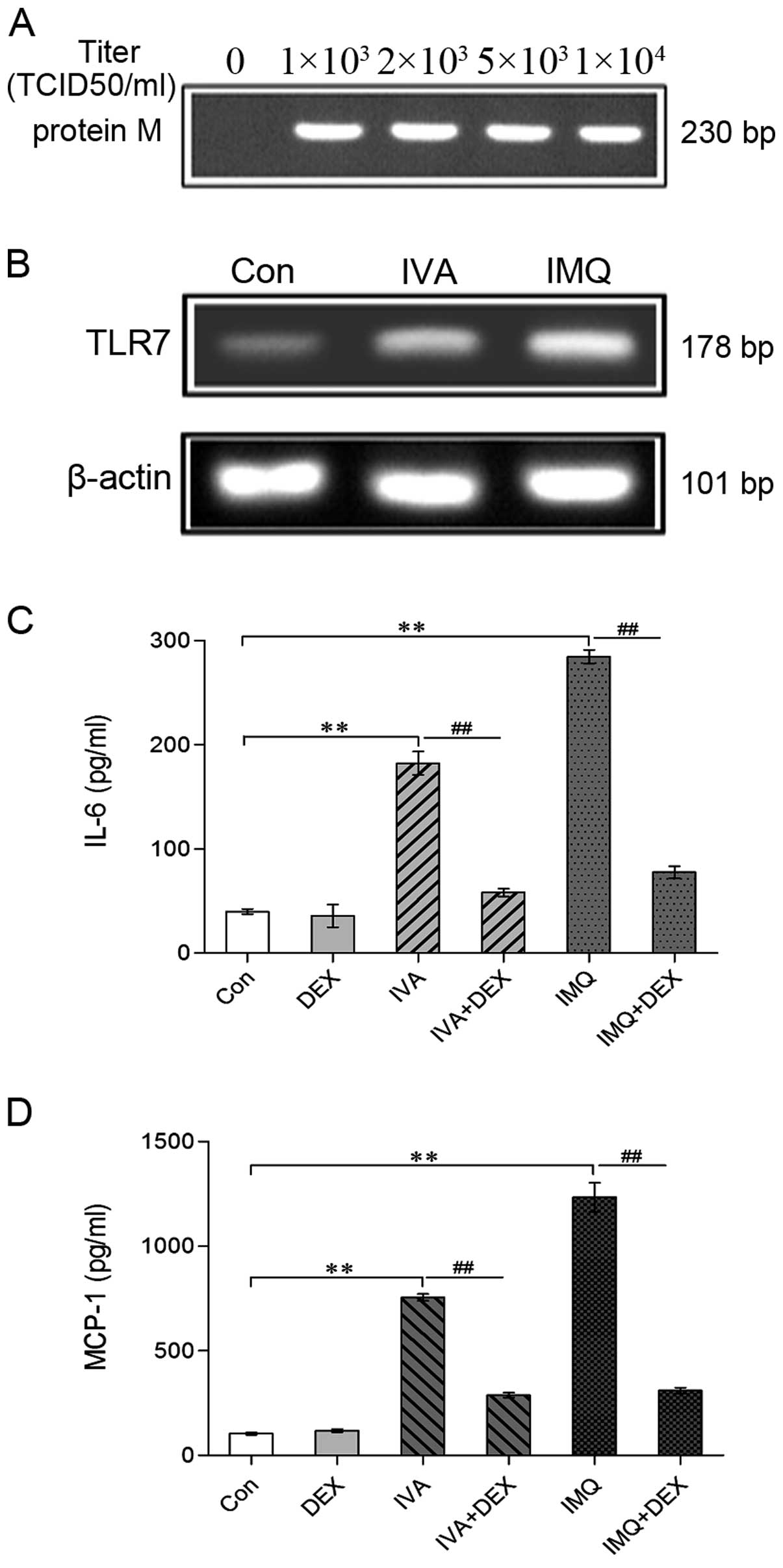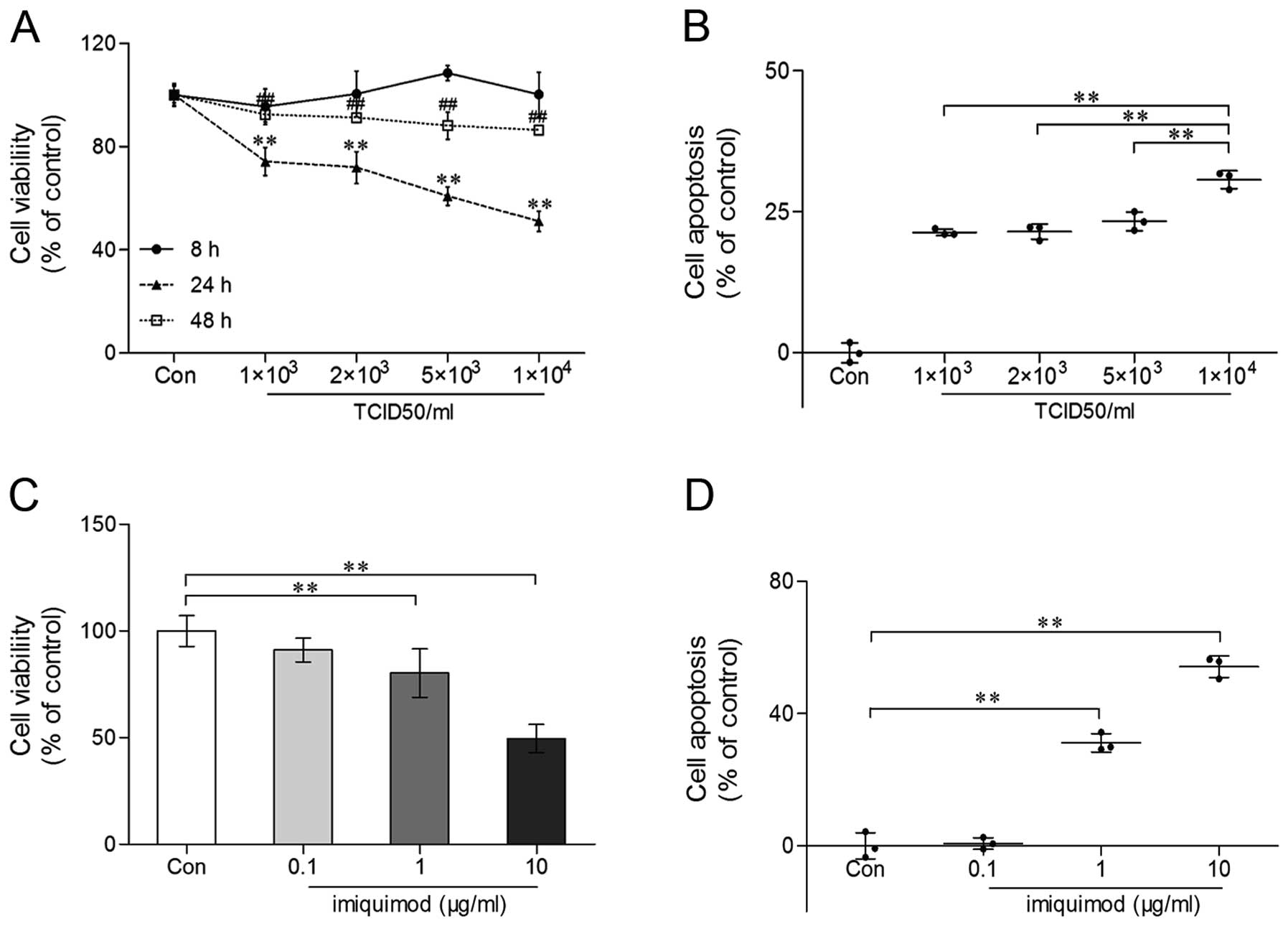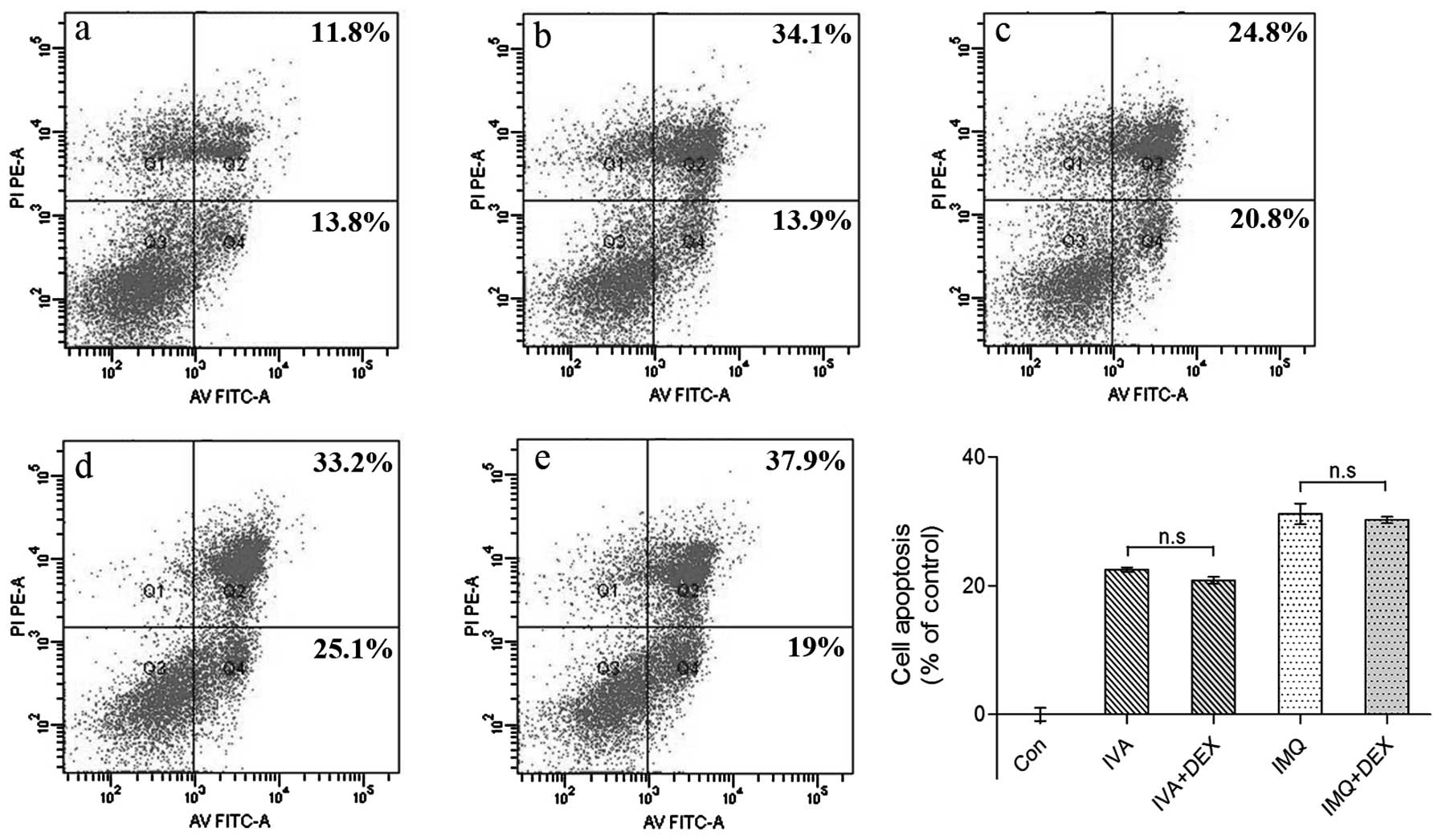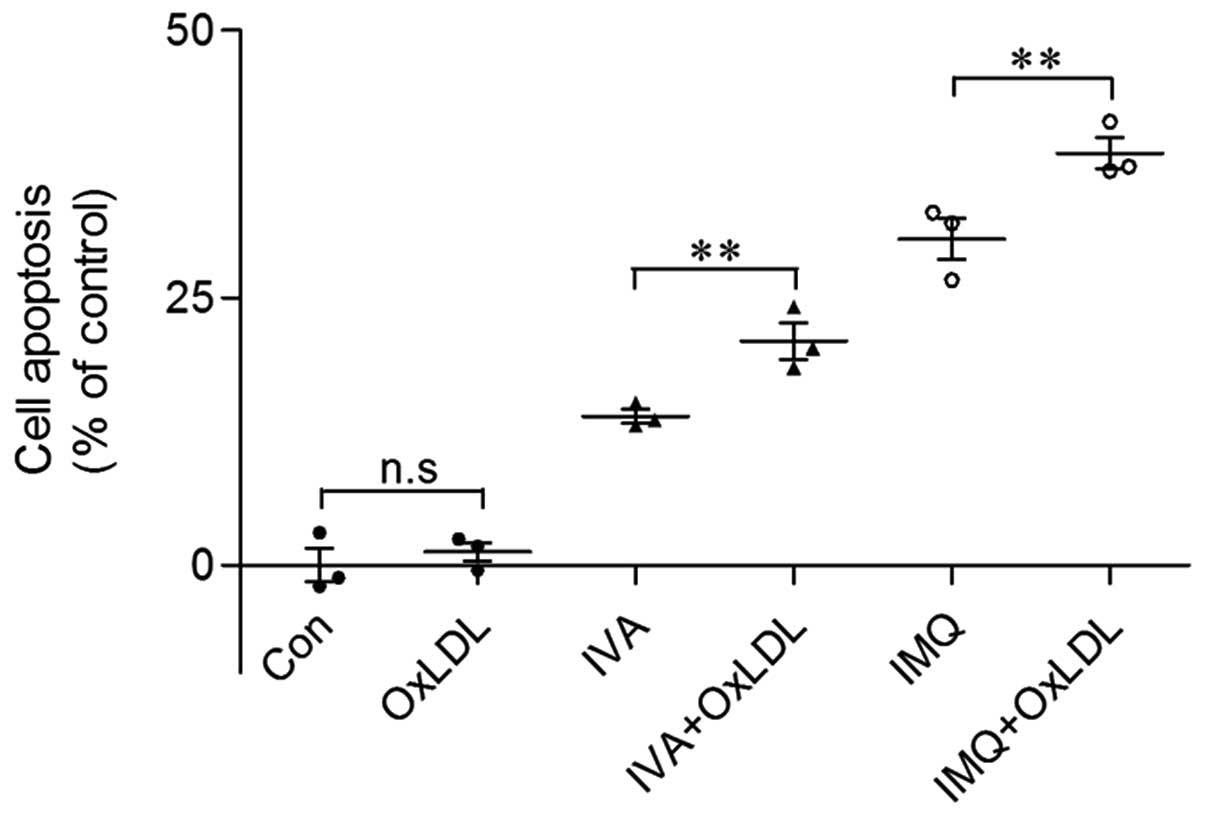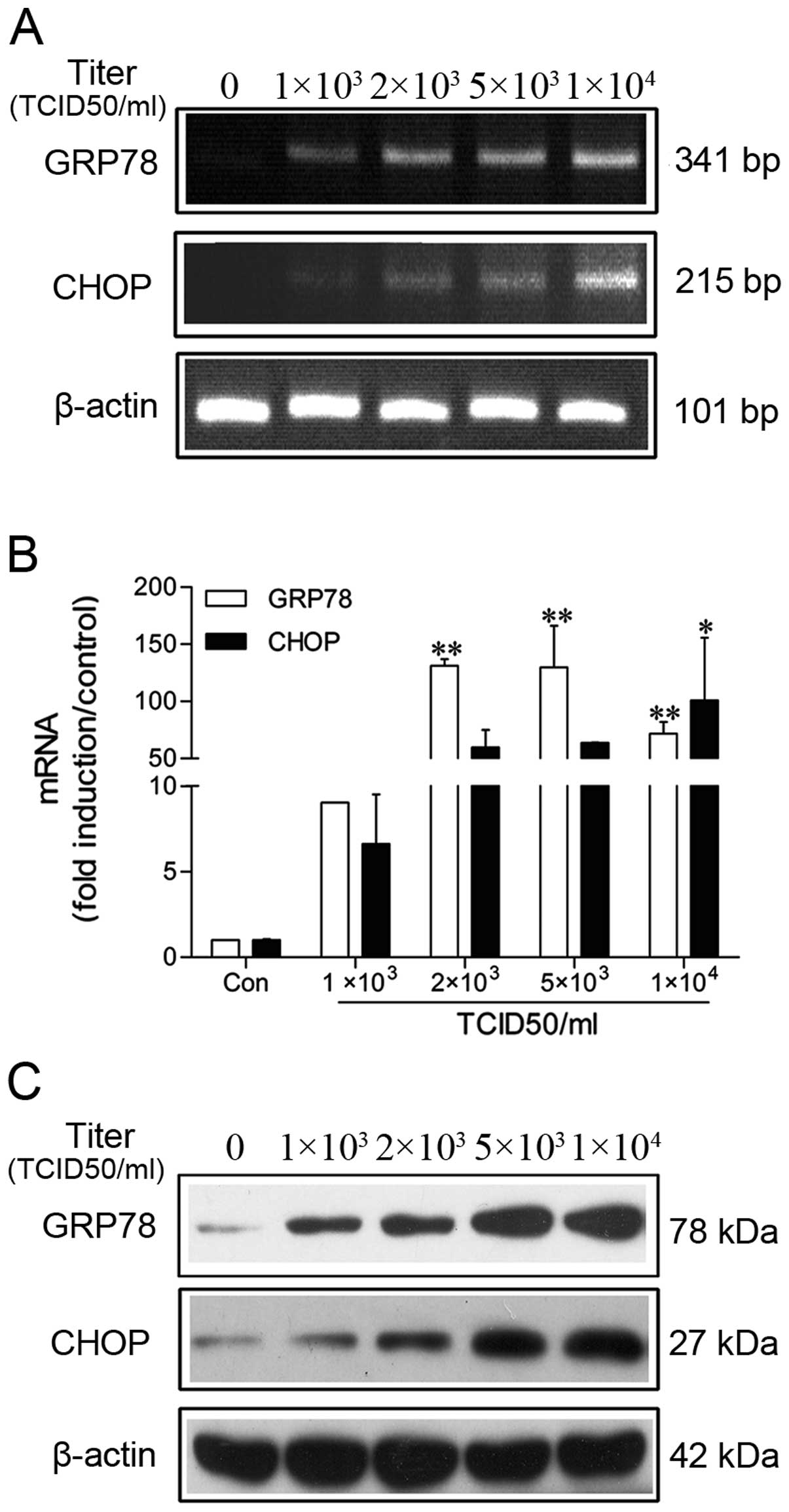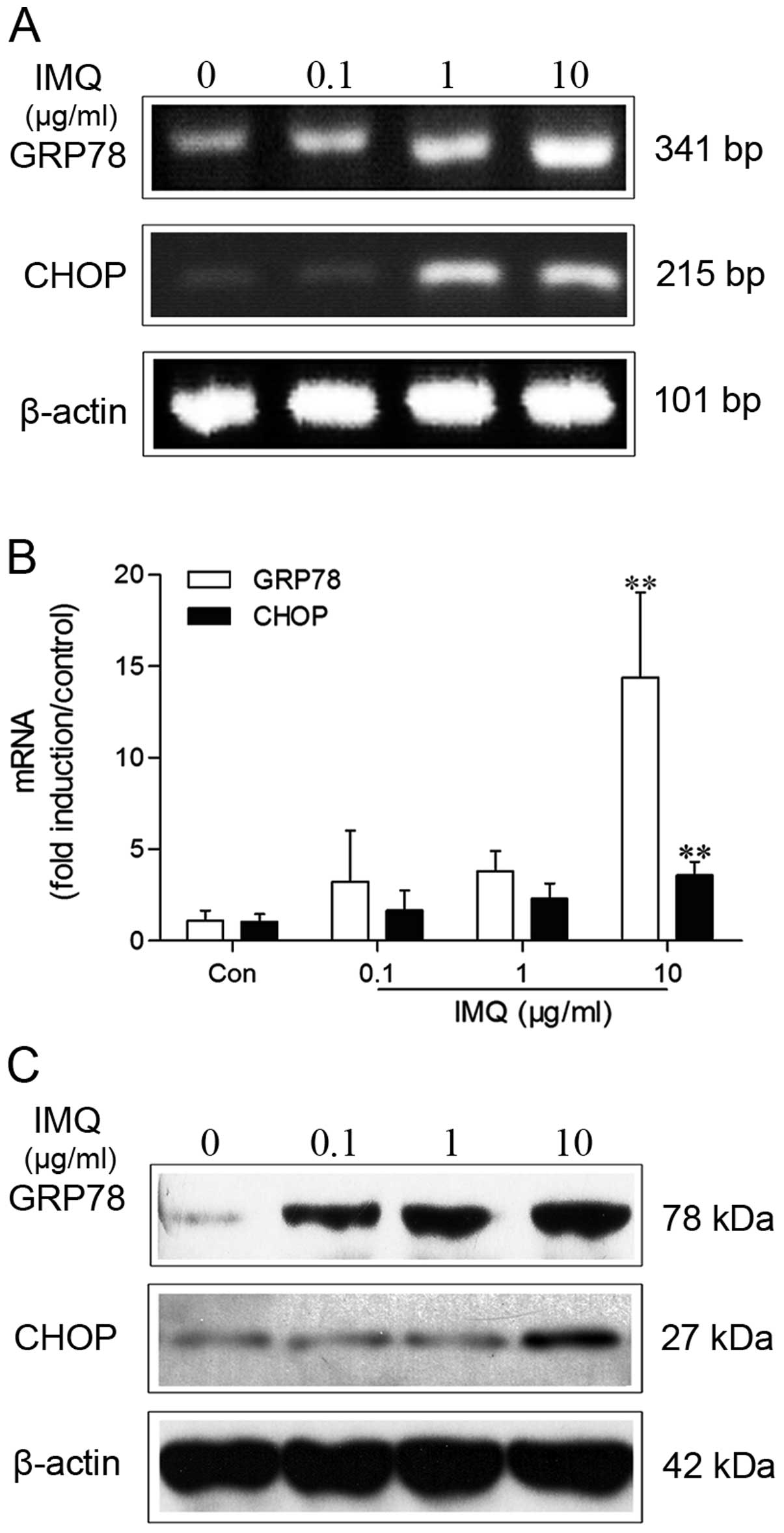|
1
|
Laufer EM, Winkens HM, Corsten MF,
Reutelingsperger CP, Narula J and Hofstra L: PET and SPECT imaging
of apoptosis in vulnerable atherosclerotic plaques with
radiolabeled Annexin A5. Q J Nucl Mol Imaging. 53:26–34.
2009.PubMed/NCBI
|
|
2
|
Seimon T and Tabas I: Mechanisms and
consequences of macrophage apoptosis in atherosclerosis. J Lipid
Res. 50:S382–S387. 2009. View Article : Google Scholar : PubMed/NCBI
|
|
3
|
Badiou S, Thiebaut R and
Aurillac-Lavignolle V: Association of non-HDL cholesterol with
subclinical atherosclerosis in HIV-positive patients. J Infect.
57:47–54. 2008. View Article : Google Scholar : PubMed/NCBI
|
|
4
|
Oshima T, Ozono R and Yano Y: Association
of Helicobacter pylori infection with systemic inflammation
and endothelial dysfunction in healthy male subjects. J Am Coll
Cardiol. 45:1219–1222. 2005.
|
|
5
|
Gurevich VS, Pleskov VM, Levaia MV,
Bannikov AI, Mitrofanova LB and Urazgil’deeva SA: Influenza virus
infection in progressing atherosclerosis. Kardiologiia. 42:21–24.
2002.PubMed/NCBI
|
|
6
|
Haidari M, Wyde PR, Litovsky S, Vela D,
Ali M, Casscells SW and Madjid M: Influenza virus directly infects,
inflames, and resides in the arteries of atherosclerotic and normal
mice. Atherosclerosis. 208:90–96. 2010. View Article : Google Scholar : PubMed/NCBI
|
|
7
|
Warren-Gash C, Smeeth L and Hayward AC:
Influenza as a trigger for acute myocardial infarction or death
from cardiovascular disease: a systematic review. Lancet Infect
Dis. 9:601–610. 2009. View Article : Google Scholar : PubMed/NCBI
|
|
8
|
Guan X, Yang W, Sun X, Wang L, Ma B, Li H
and Zhou J: Association of influenza virus infection and
inflammatory cytokines with acute myocardial infarction. Inflamm
Res. 61:591–598. 2012. View Article : Google Scholar : PubMed/NCBI
|
|
9
|
Diebold SS, Kaisho T, Hemmi H, Akira S and
Reis e Sousa C: Innate antiviral responses by means of
TLR7-mediated recognition of single-stranded RNA. Science.
303:1529–1531. 2004. View Article : Google Scholar : PubMed/NCBI
|
|
10
|
Fukuyama S and Kawaoka Y: The pathogenesis
of influenza virus infections: the contributions of virus and host
factor. Curr Opin Immunol. 23:481–486. 2012. View Article : Google Scholar : PubMed/NCBI
|
|
11
|
Cluff CW, Baldridge JR and Stöver AG:
Synthetic toll-like receptor 4 agonists stimulate innate resistance
to infectious challenge. Infect and Immun. 5:3044–3052. 2005.
View Article : Google Scholar : PubMed/NCBI
|
|
12
|
De Meyer I, Martinet W, Schrijvers DM,
Timmermans JP, Bult H and De Meyer GR: Toll-like receptor 7
stimulation by imiquimod induces macrophage autophagy and
inflammation in atherosclerotic plaques. Basic Res Cardiol.
107:2692012.PubMed/NCBI
|
|
13
|
von Krogh G, Lacey CJ, Gross G, Barrasso R
and Schneider A: European course on HPV associated pathology:
guidelines for primary care physicians for the diagnosis and
management of anogenital warts. Sex Transm Infect. 76:162–168.
2000.PubMed/NCBI
|
|
14
|
Ahn MY, Kwon SM and Cheong HH: Toll like
receptor 7 agonist, Imiquimod, inhibits oral squamous carcinoma
cells through apoptosis and necrosis. J Oral Pathol Med.
41:540–546. 2012.PubMed/NCBI
|
|
15
|
Huang SW, Chang CC and Lin CC: Mcl-1
determines the imiquimod-induced apoptosis but not
imiquimod-induced autophagy in skin cancer cells. J Dermatol Sci.
7:170–178. 2012. View Article : Google Scholar : PubMed/NCBI
|
|
16
|
Ozcan L and Tabas I: Role of endoplasmic
reticulum stress in metabolic disease and other disorder. Annu Rev
Med. 63:317–328. 2012. View Article : Google Scholar : PubMed/NCBI
|
|
17
|
Hotamisligil GS: Endoplasmic reticulum
stress and atherosclerosis. Nat Med. 16:396–399. 2010. View Article : Google Scholar : PubMed/NCBI
|
|
18
|
Kedi X, Ming Y, Yongping W, Yi Y and
Xiaoxiang Z: Free cholesterol overloading induced smooth muscle
cells death and activated both ER-and mitochondrial-dependent death
pathway. Atherosclerosis. 207:123–130. 2009. View Article : Google Scholar : PubMed/NCBI
|
|
19
|
Yao S, Zong C, Zhang Y, Sang H, Yang M,
Jiao P, Fang Y, Yang N, Song G and Qin S: Activating transcription
factor 6 mediates oxidized LDL-induced cholesterol accumulation and
apoptosis in macrophages by up-regulating CHOP expression. J
Atheroscler Thromb. 20:94–107. 2013. View Article : Google Scholar : PubMed/NCBI
|
|
20
|
Hoozemans JJ, Veerhuis R, Van Haastert ES,
Rozemuller JM, Baas F, Eikelenboom P and Scheper W: The unfolded
protein response is activated in Alzheimer’s disease. Acta
Neuropathol. 110:165–172. 2005.
|
|
21
|
Lin WC, Chuang YC and Chang YS:
Endoplasmic reticulum stress stimulates p53 expression through
NF-κB activation. PLoS One. 7:e391202012.PubMed/NCBI
|
|
22
|
Park EK, Jung HS, Yang HI, Yoo MC, Kim C
and Kim KS: Optimized THP-1 differentiation is required for the
detection of responses to weak stimuli. Inflamm Res. 56:45–50.
2007. View Article : Google Scholar : PubMed/NCBI
|
|
23
|
Mehrbod P, Ideris A, Omar AR, Hair-Bejo M,
Tan SW, Kheiri MT and Tabatabaian M: Attenuation of influenza virus
infectivity with herbal-marine compound (HESA-A): an in vitro study
in MDCK cells. Virol J. 9:442012. View Article : Google Scholar : PubMed/NCBI
|
|
24
|
Miller RL, Meng TC and Tomai MA: The
antiviral activity of Toll-like receptor 7 and 7/8 agonists. Drug
News Perspect. 21:69–87. 2008. View Article : Google Scholar : PubMed/NCBI
|
|
25
|
Muller C, Salvayre R, Nègre-Salvayre A and
Vindis C: HDLs inhibit endoplasmic reticulum stress and autophagic
response induced by oxidized LDLs. Cell Death Differ. 18:817–828.
2011. View Article : Google Scholar : PubMed/NCBI
|
|
26
|
Hundal RS, Gómez-Muñoz A, Kong JY, Salh
BS, Marotta A, Duronio V and Steinbrecher UP: Oxidized low density
lipoprotein inhibits macrophage apoptosis by blocking ceramide
generation, thereby maintaining protein kinase B activation and
Bcl-XL level. J Biol Chem. 278:24399–24408. 2003. View Article : Google Scholar
|
|
27
|
Roberson EC, Tully JE and Guala AS:
Influenza induces endoplasmic reticulum stress, caspase-12
dependent apoptosis, and c-Jun N-terminal kinase-mediated
transforming growth factor-β release in lung epithelial cells. Am J
Respir Cell Mol Biol. 46:573–581. 2012.PubMed/NCBI
|
|
28
|
Hassan IH, Zhang MS and Powers LS:
Influenza A viral replication is blocked by inhibition of the
inositol-requiring enzyme (IRE-1) stress pathway. J Biol Chem.
287:4679–4689. 2012. View Article : Google Scholar : PubMed/NCBI
|
|
29
|
Numajiri Haruki A, Naito T, Nishie T,
Saito S and Nagata K: Interferon-inducible antiviral protein MxA
enhances cell death triggered by endoplasmic reticulum stress. J
Interferon Cytokine Res. 31:847–856. 2011.PubMed/NCBI
|
|
30
|
Kim CH, Ahn JH, Kang SU, Hwang HS, Lee MH,
Pyun JH and Kang HY: Imiquimod induces apoptosis of human
melanocytes. Arch Dermatol Res. 302:301–306. 2010. View Article : Google Scholar : PubMed/NCBI
|
|
31
|
Schön M, Bong AB, Drewniok C, Herz J,
Geilen CC, Reifenberger J, Benninghoff B, Slade HB, Gollnick H and
Schön MP: Tumor-selective induction of apoptosis and the
small-molecule immune response modifier imiquimod. J Natl Cancer
Inst. 95:1138–1149. 2003.PubMed/NCBI
|
|
32
|
Halasiddappa LM, Koefeler H, Futerman AH
and Hermetter A: Oxidized phospholipids induce ceramide
accumulation in RAW 264.7 macrophages: role of ceramide synthases.
PLoS One. 8:e700022013. View Article : Google Scholar : PubMed/NCBI
|
|
33
|
The Eurowinter Group. Cold exposure and
winter mortality from ischaemic heart disease, cerebrovascular
disease, respiratory disease, and all causes in warm and cold
regions of Europe. Lancet. 349:1341–1346. 1997. View Article : Google Scholar
|
|
34
|
Davis MM, Taubert K and Benin AL:
Influenza vaccination as secondary prevention for cardiovascular
disease: a science advisory from the American Heart
Association/American College of Cardiology. Circulation.
114:1549–1553. 2006. View Article : Google Scholar
|
|
35
|
Van Lenten BJ, Wagner AC, Nayak DP, Hama
S, Navab M and Fogelman AM: High-density lipoprotein loses its
anti-inflammatory properties during acute influenza a infection.
Circulation. 103:2283–2288. 2001.PubMed/NCBI
|
|
36
|
Van Lenten BJ, Wagner AC, Anantharamaiah
GM, et al: Influenza infection promotes macrophage traffic into
arteries of mice that is prevented by D-4F, an apolipoprotein A-I
mimetic peptide. Circulation. 106:1127–1132. 2002.PubMed/NCBI
|
|
37
|
Mitchell H, Levin D, Forrest S, Beauchemin
CA, Tipper J, Knight J, Donart N, Layton RC, Pyles J, Gao P, Harrod
KS, Perelson AS and Koster F: Higher level of replication
efficiency of 2009 (H1N1) pandemic influenza virus than those of
seasonal and avian strains: kinetics from epithelial cell culture
and computational modeling. J Virol. 85:1125–1135. 2011. View Article : Google Scholar
|
|
38
|
Han JH, Lee J and Jeon SJ: In vitro
and in vivo growth inhibition of prostate cancer by the
small molecule imiquimod. Int J Oncol. 42:2087–2093. 2013.
|
|
39
|
Hur SJ, Kim DH, Chun SC and Lee SK: Effect
of adenovirus of influenza virus infection on obesity. Life Sci.
93:531–535. 2013. View Article : Google Scholar : PubMed/NCBI
|
|
40
|
Karlsson EA and Beck MA: The burden of
obesity on infectious disease. Exp Biol Med (Maywood).
235:1412–1424. 2010. View Article : Google Scholar : PubMed/NCBI
|
|
41
|
Smith AG, Sheridan PA, Harp JB and Beck
MA: Diet-induced obese mice have increased mortality and altered
immune responses when infected with influenza virus. J Nutr.
137:1236–1243. 2007.PubMed/NCBI
|















